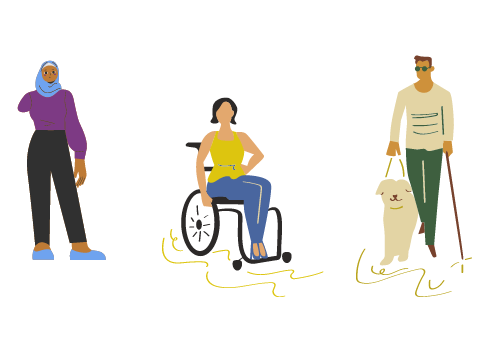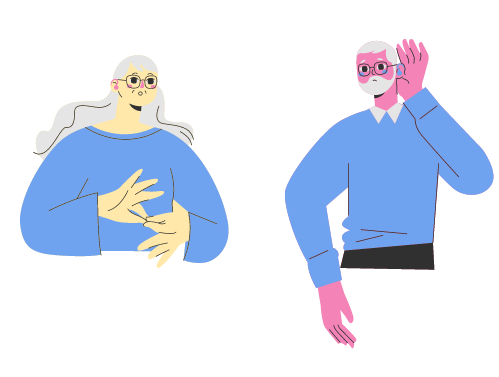People with a disability are at a higher risk of emotional, physical, and sexual violence compared to people who do not have a disability. A report by Statistics Canada (2014) found that four in ten (40%) Canadians with a disability are physically and/or sexually abused during their childhood, compared to about one‑quarter (27%) of those who do not have a disability. Furthermore, the report found that Canadians with a disability are more likely to be victimized in their own home, as close to one‑third (30%) of violent incidents against a person with a disability occur in their private residence (compared to 17% of incidents where the victim did not have a disability).

Women with disabilities experience an even wider range of emotional, physical and sexual abuse: by personal attendants and by health care providers, as well as higher rates of emotional abuse both by strangers and other family members. They also can be prevented from using a wheelchair, cane, respirator, or other assistive devices.
Despite these staggering statistics, there is very minimal literature about the risk of abuse, women’s experiences of abuse, and barriers to seeking help among women with disabilities. The absence of attention to this issue from both disability and violence researchers has contributed to the ‘invisibility’ of the victimization of women with disabilities.

Women with a disability are at risk of violence in many forms – neglect, physical abuse, sexual abuse, psychological abuse and financial exploitation. A study by the Disabled Women’s Network of Canada (DAWN Canada) found that although 1 out 5 of all Canadian women live with a disability, 40% of respondents had experienced some form of violence. Another study indicated that 60% of women with disabilities are likely to experience some form of violence in the course of their adult lives.
Women and girls with disabilities are at a high risk of experiencing gender-based and other forms of violence due to social stereotypes that often serve to reduce their agency by infantilizing, dehumanizing and isolating them, making them vulnerable to various forms of violence, including institutional violence.
(Adapted from source: Disabled Women’s Network of Canada)
Additional Resources:
“Video: Disability Pride Celebrated in Truro” [Article] — A Saltwire article about the more than 100 people who took to the streets of Truro in 2019 to celebrate disabilities and differences.
“Violence Against Women With Disabilities” [YouTube] — Tricia Malowney, Chair of Women with Disabilities Victoria, and Ariane Garner-Williams, youth and women with disabilities advocate, talk about some of the issues that arise for this doubly disadvantaged group, in terms of violence.
“Everyone’s Responsibility: Preventing Abuse Against People with Disabilities” [YouTube] — Very few people go into disability services because they want to be confronted with abuse. We don’t want to believe anyone we care about is experiencing abuse. It’s even harder to accept that someone we know and like might be perpetrating abuse against people with disabilities.
“Our fight for disability rights and why we’re not done yet” [YouTube] — In this TedX Talk, you’ll hear the story of Judith Heumann. For more than 30 years, Judith has been involved on the international front working with disabled people’s organizations and governments around the world to advance the human rights of disabled people.
“Sexuality and Disability: Forging Identity in a World that Leaves You Out” [YouTube] — Gaelynn Lea felt left out of mainstream dating and beauty culture due to her physical disability. In her talk, she recounts the epiphany that empowered her to pursue life, love, and a musical career on her own terms.
Community Connections:
STEPs on Arthur
168 Arthur Street, Truro, NS
Phone: 902-893-7228 x105
As a community-based organization, STEPs on Arthur (formally Colchester Community Workshops) currently provide service for 80 adults with intellectual disabilities. The workshops offer a wide variety of individualized programming and training opportunities for the clients that we work with as well as providing a quality service to our customers.
Truro Inclusion Project
Truro, NS
Phone: 902-899-6321
Under the umbrella of Colchester Residential Services Society, The Truro Inclusion Project is a group of dedicated community members who are employed to work with people with disabilities, and who simply want Truro to be inclusive of all its residents to grow their social, spiritual, recreational, and vocational potential. They aim to provide a safe and secure space that will foster inclusion for all residents in Truro and surrounding areas regardless of abilities, color, religion, gender, sex, orientation, socio-economic background, or any other human differences.
Nova Scotia Disability Support Program (DSP)
Province of Nova Scotia
The Disability Support Program (DSP) serves children, youth and adults with intellectual disabilities, long-term mental illness and physical disabilities in a range of community-based, residential and vocational/day programs. These are voluntary programs designed to support people at various stages of their development and independence.
Disabled Women’s Network of Canada (DAWN Canada)
469 Jean Talon West, #215, Montreal, QC
Phone: 514-396-0009
Toll free: 1-866-396-0074
DAWN Canada’s mission is to end the poverty, isolation, discrimination and violence experienced by women with disabilities and Deaf women. DAWN is an organization that works towards the advancement and inclusion of women and girls with disabilities and Deaf women in Canada. Their overarching strategic theme is one of leadership, partnership and networking to engage all levels of government and the wider disability and women’s sectors and other stakeholders in addressing our key issues.

